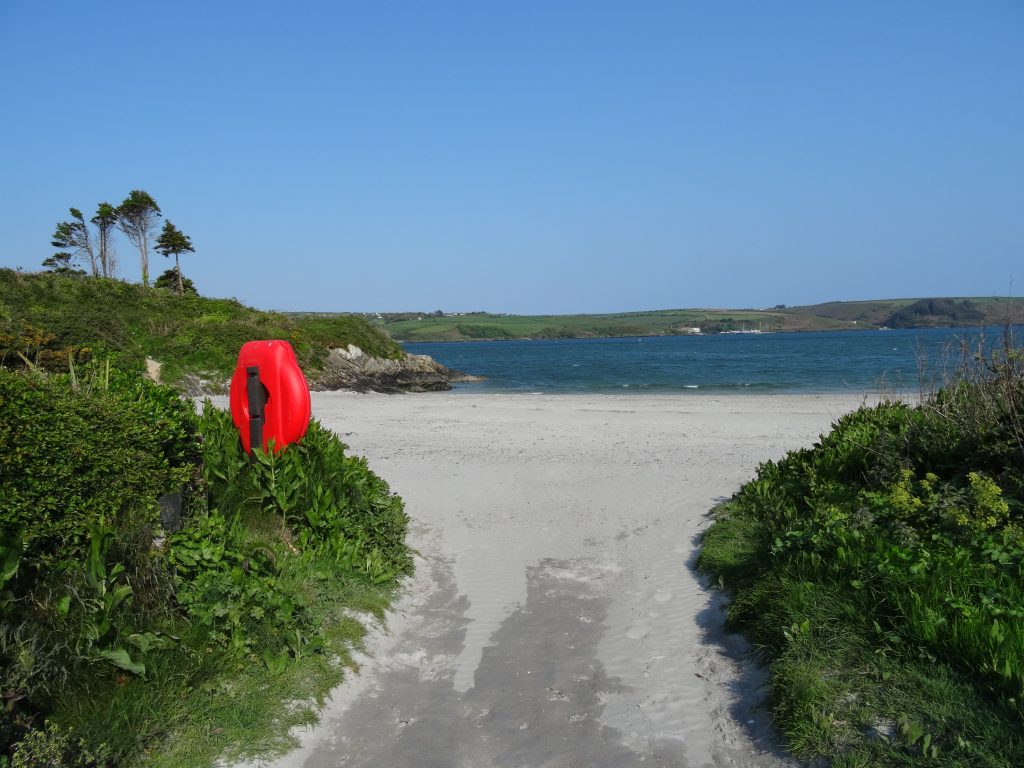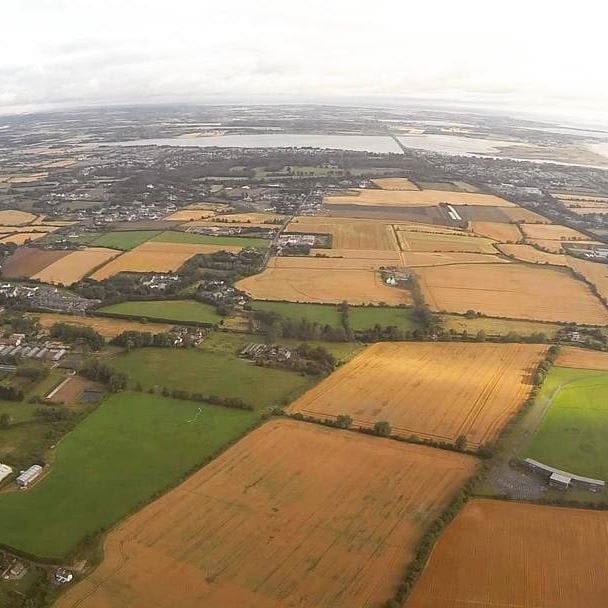So, you want to know how to move to Ireland?! In this blog post, I’ll give you all the details on the different types of work visas and how to apply for them. Plus, how to find a job, how to find an apartment/house to rent or buy!
Recently, my husband and I moved to Ireland. Having lived abroad for ten years, it shouldn’t have been too big a deal for us to move to a new country. But, the process of moving to Ireland is renowned for being quite tricky. So, we were prepared to put in the hard work.
First, there are so many different types of work visas for Ireland that knowing which one is right for you can be confusing. Second, the housing crisis in Ireland is very real, and finding a home to rent or buy will be very difficult. Lastly, Ireland is a very expensive place to live, so having some savings is essential!
Below, you will read about all the hurdles we faced in moving to Ireland, as well as the positive side of relocating to such a stunning, friendly nation!
Is it worth relocating to Ireland?

For the average person, the process of moving to Ireland will be a difficult one! You will likely need to apply for an employment permit (there are lots of different types.) If you are lucky enough to have Irish ancestry or are married to an Irish citizen, the process will be much easier!
For us, visa-wise, it was easy to move to Ireland as I am an Irish citizen, and my husband is from England. If you’re coming from the European Economic Area – these are all the countries in the European Union and Norway, Iceland, Liechtenstein, and Switzerland, you’re in luck. You don’t need a visa for Ireland or a work permit. You will, however, need to prove your financial stability after three months of living in Ireland.
If your parents or grandparents were born in Ireland, then you can apply for Irish citizenship directly. You can also apply for citizenship if you are married to an Irish person. But there are lots of stipulations with this (I’ve covered it in more detail later in this blog post.) You can find more information about applying for Irish citizenship here.
If the above doesn’t apply to you and you are a non-EU/EEA national, you will need to get permission to work in Ireland from the Department of Business, Enterprise, and Innovation (DBEI). The type of work permit you apply for will depend on your job type and the duration of your stay. Again, more on work permits for Ireland can be read below.
Is it easy to immigrate to Ireland?

No, to put it plainly, it is not easy to immigrate to Ireland. Unless you are an Irish citizen!
For most people, an employment permit to work in Ireland is their only option (more on the different types of work visas below.) The luckier ones can apply for Irish citizenship if their parents or grandparents were born in Ireland or another qualifying EU country. This is called citizenship by naturalization, and you can read more about it on the citizen’s information website!
Another immigration route is if you are the spouse of an Irish citizen. If this is the case for you, you can also apply to become an Irish citizen by naturalization. However, you must have been residing in Ireland or Northern Ireland for the past 3 out of 5 years before applying. You must also meet the following conditions:
- You are aged over 18.
- Be married for more than 3 years.
- Or be in a defacto relationship and have lived together for at least 2 years.
- You have lived in Ireland/ Northern Ireland for 5 out of the 9 years before you made your application. Plus, you must have lived in either of the above continuously for one year before the date of your application.
- You live with your spouse.
- You plan to live in Ireland once you become an Irish citizen.
- You are of ‘good character.’
How many types of work permits are there for Ireland?

There are 9 work permits you can apply for in Ireland. But the most popular work permits are the Critical Skills Employment Permit and the General Employment Permit. I will list these work permits and their qualifications below.
1. Critical Skills Employment Permit
For this work permit, you must first meet one of two qualifications. The first is that you do not work for a profession that is found on the ineligible jobs list. If your profession is on this list then you may not apply for this visa.
One requirement for applying for Ireland’s Critical Skills Employment Permit is having a profession that is considered “highly skilled.” These professions are sought after because these jobs are currently facing major shortages in Ireland. These professions include – Engineering; Natural & Social Science; Health, Information & Communication Technology among others. For a fully up-to-date list, see the DBEI’s website.
If applying from outside the EU you must apply for this visa from your home country, as non-EU’s cannot search for work in Ireland as a visitor.
In addition to the above, you must also meet the following requirements:
- If your profession is on the “highly skilled” list, then you must receive an annual salary of at least €38,000.
- If your profession is not on the “highly skilled” list, then you must receive an annual salary of €64,000.
- Your offered work contract must be for a period of two years.
- You must hold the relevant degrees and experience required to accept your position.
Once your Critical Skills Employment visa has been granted, you must remain with your company for at least one full year. Once the year is up, you may change employers. Your employer must also prove that their company has a staff made up of at least 50% EU/EEA citizens at the time of your hiring. There are exceptions to this rule for start-ups.
2. General Employment Permit
If your job and salary do not qualify you for the Critical Skills Employment visa, you can apply for the General Employment permit. Be warned; your job still cannot fall on the ineligible list of occupations.
This visa can last for 2 years and then be renewed for an additional 3 years. After this, one can apply for long-term residency.
The following are the requirements to be eligible for the Irish General Employment Permit:
- You must earn a minimum of €34,000 per year (exceptions are made for certain occupations (e.g. Meat Processor worker and Horticulture worker), who can earn a minimum of €30,000 annually).
- Your employer must be registered with the Revenue Commissioners and with the Companies Registration Office/Registry of Friendly Societies;
- Your company must be made of at least 50% EU/EEA citizens unless they are a startup or you are the only employee;
- You must have the relevant degree(s) and experience necessary to qualify for the position for which you have been hired.
Other popular permits to move to Ireland:

- Dependent/Partner/Spouse Employment Permits: Is a work visa and a family visa. It is issued to the dependent, partner, or spouse of a Critical Skills Employment permit holder. It allows holders to work in any profession, even ones that are on the ineligible list.
- Intra-Company Transfer Employment Permit: It is issued to individuals who transfer to the Irish branch of a company in which they are already employed. This is typically only available for senior management, key employees, and trainees.
- Stamp 2 (Study Visa): For this, you must enroll in a full-time University course and pay all tuition and fees upfront. You must also show that you have €7,000 for each year of study to cover your expenses. Please note that only PhD students can take their families with them to Ireland.
- Stamp 0 (Retirement Visa): For this visa, you will need €50,000 in accessible funds per year. You will also need access to emergency funds equal to the price of a house here in Ireland. Which as I said is around €300,000. You cannot work in Ireland on this visa.
- Working Holiday Visa: Young people (typically aged from 18-35) from countries like the United States, Canada, Australia, New Zealand, etc. can apply for a working holiday visa to come to Ireland for up to 1 year. Canadians get 2 years.
You can read about all the other work permits available in Ireland here.
How much money should I have to move to Ireland?

Before moving to Ireland you need to keep in mind that although it’s a fabulous place to call home, it is a very expensive country to live in. In fact, Ireland is 95% more expensive than other countries in the world.
We estimate that the monthly outgoings for a single person living in Ireland is €3,000 per month. So my best advice is to have at least €10,000 in savings before making the move to Ireland. This means that you can cover rent, bills, and food expenses for a few months in the beginning while you wait to be paid/ find a job. If you plan to buy a house in Ireland as a foreigner then obviously you will need a lot more as the average price of a property here sits at around €300,000.
As I said, it is expensive to live in Ireland, especially if you plan on living in one of the big cities like Dublin or Cork. Dublin can be especially expensive for rent; depending on the area, expect to pay up to €2,000 per month for a one-bedroom apartment! Yup, the average rent in County Dublin now stands at an eye-watering €2,400. Here’s a detailed guide I wrote about renting in Ireland that I’m sure you’ll find very useful!
In Cork, on the other hand, the average rent in Cork city is now around €1,800. At the other end of the scale, counties like Leitrim, Donegal, Longford, and Roscommon are significantly cheaper. I mean, you’re looking at just €775 for a two-bedroom house in Donegal per month.
Top Tip: To search for the best property rentals in Ireland, I recommend Daft.
How much money should I have saved?
In short, I recommend having a minimum of €10,000 saved before moving to Ireland. As you’ll need that for your first month’s rent, your rental deposit (typically one month’s rent), and other start-up costs.
For your daily expenses, this gives you a good insight into how much things like dining out, a takeaway coffee, and even a liter of milk will cost you in Ireland.
To have a good standard of living in Ireland, I would guess that you would need to earn a minimum of €17 per hour. More like €20 per hour in Dublin, considering the extortionate rent costs. Of course, to reduce the cost of rent, you may choose to rent a room in cities like Dublin or Cork.
It’s also worth noting that opening a traditional bank account here can be a drawn-out process with a lengthy approval process. I was recently introduced to Money Jar, a Neobank that uses digital verification and a liveness test to set up your account. Money Jar offers users a prepaid Mastercard with Apple Pay and Google Pay and is accepted everywhere Mastercard is. What’s great, too, is that MoneyJar also offers its customers an Irish IBAN. Something most other digital banks in Ireland don’t offer; an IBAN is often needed to pay utility bills, etc.
Can foreigners buy property in Ireland?

There are no restrictions for foreigners purchasing property in Ireland. But remember that buying a property here does not guarantee you the right to reside in Ireland! However, residence by investment is possible in Ireland. That involves a minimum one million investment or €500,000 charitable donation.
What are the rules for moving to Ireland without a job?

You can travel to Ireland without a visa for three months only. Any plan to stay longer than that and you have three main options. Those options are to go to Ireland to work, to study, or to retire.
For the Retirement Visa (Stamp 0) you are required to have an annual income of no less than €50,000 per person. Or €100,000 for a married couple for the remainder of their lives in Ireland. Regardless of their existing cash on hand or lack of debt. You cannot work in Ireland on a Stamp 0 nor can you qualify for Irish citizenship. You are also limited to the number of days per year that you can spend outside of Ireland.
Is Ireland a good country to move to?

Yes, Ireland is a good country to move to!
It is renowned for being one of the most beautiful countries in the world, nicknamed the ’emerald isle.’ This small country is true to its name, with lush green fields pretty much everywhere you look. Ireland is also filled with gorgeous beaches, stunning hiking trails, and plenty of wow-worthy national parks like Killarney National Park.
But living in Ireland is about more than how pretty it is. The pace of life here is slower, the people super-welcoming and friendly, and once you’re an Irish citizen, you’re eligible for free public healthcare! Plus, maternity care is free, too, and so are GP visits for children up until they turn 8.
If you’re planning to move to Ireland with your kids, then you’ll be happy to hear that the education system in Ireland is one of the best in the world. And it scores the highest in Europe for its reading and literacy. Also, most University undergraduate degrees here are free for Irish citizens.
For us, moving to Ireland was the best decision we could have made at this stage in our lives. Here in Ireland, we found a cheap house to rent (update we’ve now bought a house near Kinsale in West Cork!) And we have been able to enjoy some quality time with family and friends. Having been abroad for close to 10 years – this is the nicest part of moving to Ireland for us.
Related Read: Cobh in County Cork is a popular place for expats to move to!
Important information once you’ve arrived in Ireland

Getting a PPS number:
I will advise – that you apply for your PPS number as soon as you arrive in the country, as it took close to 2 months for my British husband to receive his. Here is where to apply for your PPS Number.
A PPS number is similar to a social security number in that you will need on to get a job, pay taxes, get an Irish driver’s license, etc.
Applying for an Irish Driver’s License:
Once you have your PPS number, you can apply to have your foreign driver’s license changed to an Irish one. You can make an appointment here. This option is for those coming from Australia, New Zealand and the UK – where they also drive on the left. Worth noting – is that you can only drive for 12 months in Ireland on a foreign license.
If you’re coming from the U.S. – you must take the theory test, then six driving lessons and then a road test. Once, you do those things you will be considered a new driver by Irish insurance companies for 2 years (so you’ll be paying a higher price for insurance!)
Buying Irish car insurance:
For car insurance – if you are looking to be insured whilst on a foreign driver’s license, there are very limited insurers that will accept you. We found Liberty Insurance to be the most competitively priced, as they accept overseas no-claims bonuses. Car insurance is high in Ireland – ours is €1,600 a year on a 1.4 liter Ford Focus. Your insurance premium will be reduced when you change to an Irish Licence, be sure to let your insurer know as soon as you change your license.
A good idea is to rent a car in Ireland for your first few weeks so that you can easily get around to house viewings, do your food shopping, etc.
Getting an Irish Cell phone:
Arrange your Irish cell phone number before you arrive, if possible. We purchased a €15 monthly prepaid plan with Virgin which includes 60 minutes of calls, unlimited texts, and unlimited data. We had our sim card sent to our address in Ireland, so, it was waiting for us when we arrived. You could also have the sim card sent to your Airbnb or hotel. Other popular cell phone networks are Three and Eir.
Alternatively, you could use an eSIM in the beginning as that way you won’t need to change your number or remove the physical SIM from your phone until you’re fully set up in Ireland.
Thanks for reading!

Moving to Ireland was the best decision we could have made for us at this time – who knows where our lives will take us in the next few years. But, for now, Ireland is home!
This Summer, we’ve spent time exploring the best things to do in West Cork, spending time in Cork City and it’s made us fall back in love with Ireland again, if I’m honest. Another region I love is the very green Ballyhoura in Limerick.
If you enjoyed this blog post about moving to Ireland, you might also like to read my other blogs about Ireland. You can check them out here –
15 Best Free Things to do in Cork City
Best Free Things to do in Cork County
What they don’t tell you about moving home after living abroad
A day at Blarney Castle and Gardens
Like this? Then, please PIN IT for later!

Last Updated on November 8, 2024 by snaphappytravel


16 thoughts on “Moving to Ireland: My Honest Experience!”
Congratulations on your move to Ireland! It sounds like quite the adventure, especially after living in different countries around the world. It’s interesting to read about the hurdles you faced in relocating to Ireland, particularly with regards to visas and work permits. It’s great that you and your husband were able to qualify for visas due to your Irish citizenship and his British nationality. It’s also helpful to know about the different types of work permits available in Ireland and their qualifications, such as the Critical Skills Employment Permit and the General Employment Permit. It’s clear that there are certain requirements and criteria to meet in order to be eligible for these permits, but it’s good to see that there are opportunities for those in high-demand professions.
Thanks sharing this article about the Ireland experience
You really had a great experience of Ireland. This is so amazing reading for me. Thank you for sharing it.
Can a tourist visa holder can work in Ireland? Im planning to apply a tourist visa and look for an employer in Ireland before a 90 days expires. is this possible?
Wow this is really too good abou the moving ireland my experience thnaks sharing this article
Thanks sharing this article
I have to dream this dream place ,,,, i never caught this ,,,,,,,,,,,, am so lucky that i have read this blog post
Thank you so much to give boost my travelling feeling
My daughter is studying in Dudalk and I am working with software company in India. I wish to migrate but my company doesn’t have any open positions in Dublin. Please advise which Visa I can apply for?
Thanks a lot. Article was very much helpful and answered many queries which I had
Thank you, glad I could help!
This was so interesting to read about your experience moving to Ireland, and I’m sure it will be really helpful for people in a similar situation!
My family and I am planning on moving to ireland in the next couple of years. Half my family and myself are Irish, my husband on other hand is not. We have three children moving from Botswana to Ireland I think is best for us, more so for the children. My husband has a lot of uncertenty about moving as he has to go through the whole permit story. I have been ready up alot about what we need to do but not as clear as what you just mentioned.
Thank you for this wonderful information. I’m dreaming without a plan but recently found out that my natural grandparents (paternal side) are from Ireland (and everyone before them). I am adopted and my natural father’s name is not on my birth certificate, nor have I engaged him yet to even meet. I have been trying to find out from Ireland if there is even a remote chance should all the stars line up and one day I can prove who my father is….but I am completely stuck. This is a crazy situation but I am very Irish and they allow citizenship for grandchildren of an Irish born citizen.
Oh wow, what an interesting story. I’m sorry I can’t help with that but perhaps an immigration lawyer may be able to offer some advice. I really hope it works out for you xx
What health insurance do you recommend?
Talk about so much to do in so little time. Good luck to you in Ireland. It sounds amazing!